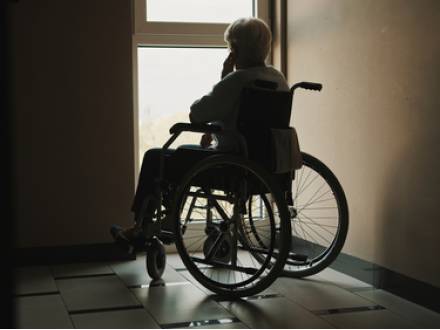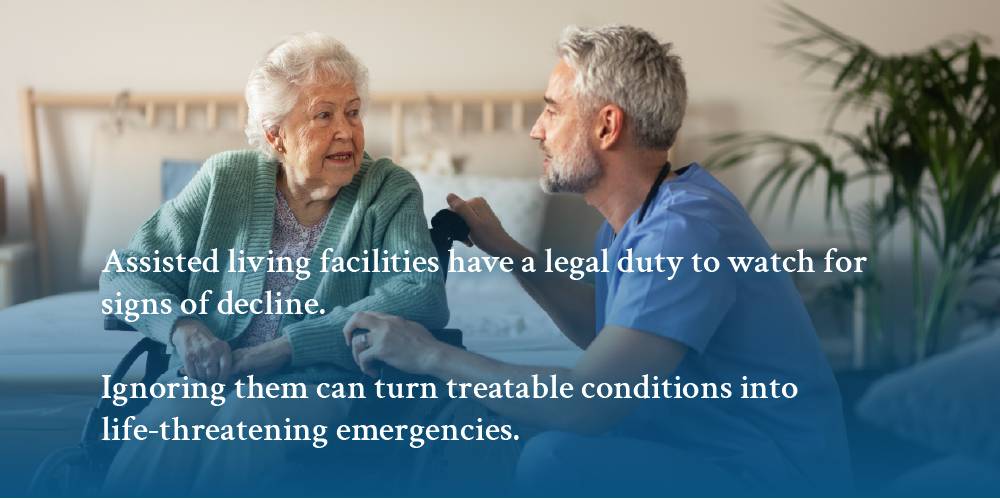Do Assisted Living Centers Need to Watch Residents for Worsening Conditions?
 For many seniors and individuals with disabilities, the difference between attentive care and neglect in a nursing home can mean the difference between life and death. One of the most common and preventable causes of serious harm in nursing homes is the failure to monitor residents for worsening health conditions.
For many seniors and individuals with disabilities, the difference between attentive care and neglect in a nursing home can mean the difference between life and death. One of the most common and preventable causes of serious harm in nursing homes is the failure to monitor residents for worsening health conditions.
In Illinois, assisted living facilities and nursing homes have a legal and ethical duty to respond to signs that a resident is getting sicker. When they do not, the results can include serious illness, hospitalization, or even wrongful death.
For families who lose a loved one, or who face serious expenses and complications, this is devastating. It is normal to wonder what the nursing home is responsible for and whether you could have done anything different yourself.
At Schwartz Injury Law, we focus on families dealing with complicated nursing home cases. Our Chicago nursing home neglect lawyers have seen first hand how serious nursing home neglect can change lives forever. Call us today to talk about your situation.
Common Conditions in Nursing Home Patients That Can Worsen Quickly
Many assisted living residents suffer from chronic conditions that can get worse very quickly. Some of the most common conditions that require careful monitoring include:
Pressure Ulcers (Bedsores)
Pressure ulcers develop when residents remain in one position for too long without being moved. These wounds can start as mild redness but rapidly progress into deep infections that reach muscle or bone.
Dehydration and Malnutrition
Residents who cannot feed or hydrate themselves rely on staff to monitor food and fluid intake. Sudden weight loss, confusion, or fatigue can indicate dehydration or malnutrition.
Infections
From urinary tract infections to pneumonia, infections are among the most common causes of death in long-term care settings. Many begin as minor issues but worsen rapidly without timely antibiotics or hospitalization.
Diabetes and Blood Sugar Changes
Diabetic residents need consistent monitoring of blood glucose levels, diet, and medication. Neglect can cause hypoglycemia or hyperglycemia, both of which can be fatal if untreated.
Falls and Mobility Decline
Changes in balance, strength, or medication can increase a resident’s fall risk. Assisted living centers are required to perform risk assessments and adapt care plans accordingly.
Cognitive Decline and Dementia
Residents with Alzheimer’s or other forms of dementia need careful supervision to prevent wandering, self-harm, or neglect of personal needs. Staff must watch for changes in behavior, speech, and awareness, and tell doctors if there is a significant decline.
Cardiac and Respiratory Problems
Elderly residents with heart or lung conditions are at high risk for rapid deterioration. Assisted living staff must monitor these residents regularly for shortness of breath, chest pain, and swelling.
Nursing Home Neglect Can Lead to Dangerous Conditions and Even Death
When assisted living staff ignore or overlook changes in a resident’s condition, the results can be devastating. Worsening, untreated conditions in nursing homes are prone to develop into hospitalization for preventable emergencies such as sepsis or dehydration. Residents with many years left to live are sometimes left with permanent disabilities due to untreated infections or injuries. In the most serious cases, residents can die from being untreated.
Nursing homes are not made up of evil people who do not care about their residents, but they need policies in place to protect the people placed under their watch. Neglect can take many forms. Sometimes, it is because too few employees are responsible for too many residents. Other times, it happens because of poor training, or poor communication between caregivers and supervisors. In some cases, the facility may intentionally avoid reporting problems to protect its reputation and avoid fees.
When a facility’s negligence causes harm, families can pursue a personal injury or wrongful death claim under the Illinois Nursing Home Care Act (210 ILCS 45/). This law gives residents the right to live free from neglect and abuse and allows families to hold facilities accountable through civil lawsuits.
How to Recognize When Something Is Wrong with a Parent in a Nursing Home
Family members play a vital role in identifying neglect early on. Even with limited visiting hours, loved ones can often detect warning signs before staff report them. These include:
-
Sudden or unexplained weight loss
-
Changes in mood, including confusion or lethargy
-
Frequent infections or unexplained fevers
-
Bedsores or open wounds
-
Dehydration, dry mouth, or sunken eyes
-
Unusual bruising or injuries
-
Delayed communication from facility staff about health updates
If you notice any of these signs, ask to meet with the facility administrator and demand an explanation. Document everything and contact an experienced nursing home injury attorney to look into your legal options.
Can Families File a Lawsuit for Worsening Health Conditions?
Families can take legal action if a facility’s negligence leads to serious injury or death. A nursing home neglect claim or wrongful death lawsuit can seek compensation for any costs caused by negligence. This commonly includes medical bills and hospitalization, as well as funeral and burial expenses in fatal cases.
Grieving families can also sometimes recover compensation for their pain and suffering, including loss of companionship and emotional distress. If the nursing home’s neglect was willful or reckless, families may be able to recover punitive damages.
An investigation into a facility’s conduct can also reveal broader patterns of neglect, such as falsified medical charts or staffing violations. Successful cases often encourage reforms that protect other residents from similar harm.

Do I Need a Lawyer for a Lawsuit Against My Parent’s Nursing Home?
Proving that a facility did not monitor a resident’s condition takes a lot of detailed evidence. Attorneys who handle nursing home injury cases get this in many ways. They may work with medical experts, review nursing home staff logs, and look at staff training records to figure out exactly what went wrong.
Nursing homes often have legal teams and insurance companies working to deny their responsibility. Without a good attorney, families may be pressured into accepting low settlements or may not realize they have a claim at all. An experienced attorney helps with all of this so a family can focus on their loved one’s life and memory.
Call a Chicago, IL Nursing Home Injury Lawyer Today
If your loved one suffered because an assisted living center did not watch their condition carefully, you do not need to deal with this alone. The experienced Cook County nursing home injury attorneys at Schwartz Injury Law represent families in nursing home negligence and wrongful death cases. We know how to uncover the truth and pursue full compensation for your family.
We offer free consultations and handle all nursing home injury cases on a contingency fee basis. This means you pay no legal fees unless we recover compensation for you. To take the first step toward justice, call Schwartz Injury Law at 312-535-4625 today.

 312-535-4625
312-535-4625





